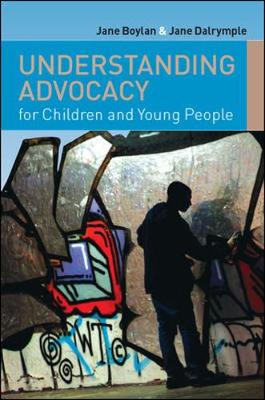"A welcome contribution not only towards the development of advocacy policy and practice with children and young people across the UK and further afield but also towards the wider field of furthering children and young people's participation, individually and collectively in decisions affecting them. The authors ... deftly combine ... very pertinent theoretical perspectives with case studies and practical illustrations of how ... discourses play out in the real world of children and young people's lives. In so doing the book provides a powerful and timely reminder to practitioners, policy makers and commissioners of the importance of critical reflective practice in understanding the dynamics at play."
Anne Crowley, Assistant Director (Policy and Research), Save the Children UK"This book is a serious read for anyone interested in the development of children's rights and advocacy. It has been thoroughly researched by two of the most highly respected commentators on the subject, and represents an authoritative and comprehensive guide. I would especially commend it to policy makers as providing a realistic account of what sometimes prevents good children's rights and advocacy practice, and for tackling very real and contentious issues such as 'best interest' principles getting in the way of giving full expression of children's own views."
Mike Lindsay, National Co-ordinator of Children's Rights Alliance for EnglandPresenting children and young people's advocacy as an exciting, radical and constantly developing way of working, Boylan and Dalrymple explore its controversial and challenging nature through a comprehensive examination of the theory and practice of advocacy. Readers are invited to consider advocacy as a powerful tool for promoting change in attitudes towards children and young people. The development of meaningful participation in decision making and systemic change in the provision of services for children and young people is identified as key to this process.
While advocacy now has a higher profile within health, welfare and education services, the authors argue for critical engagement with the dilemmas and paradoxes it continues to present. More traditional ways of advocacy practice are evaluated alongside newer approaches such as non-instructed advocacy and e-advocacy. Key issues explored include:
The authors draw on their own research and the experiences of young people, advocates and professionals working with children and young people to examine key messages and debates that have emerged. Case examples are used to illustrate advocacy dilemmas in a range of settings.
- An historical overview of advocacy within professional practice
- The development of independent advocacy
- The contested nature of advocacy
- Children and young people's participation
- Forms and models for the provision of advocacy
- The relationship between advocacy and anti-oppressive practice
Understanding Advocacy for Children and Young People is an essential text for advocates and professionals working with children and young people. It is also suitable as a key resource for health and social care practitioners, educators, commissioners and policy makers.
- ISBN13 9780335223725
- Publish Date 16 June 2009 (first published 1 June 2009)
- Publish Status Out of Print
- Out of Print 12 August 2015
- Publish Country GB
- Imprint Open University Press
- Format Hardcover
- Pages 160
- Language English
